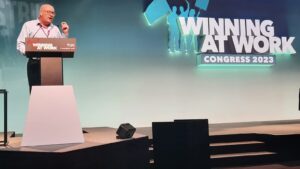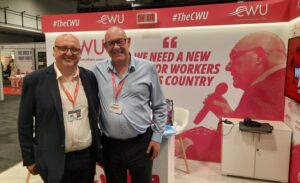CWU wins unanimous support for ‘Co-ordinating our Movement’ motion
Union Matters September 11 2023
A busy afternoon at Congress sees a big win for our union and massive backing for solidarity against anti-union laws…
“The power is in this room, in every one of you,” said our general secretary Dave Ward as he moved the CWU’s successful motion on the need to co-ordinate the whole UK trade union movement at Congress this afternoon.
Employers know that the only people resisting their attacks are organised workers, he continued, and praised all unions and members who had taken strike action over the past period, a period which had seen more industrial disputes than for several decades.
Co-ordination was the ley to success, Dave pointed out, saying that the CWU’s policy that there needed to be sector-wide bargaining agendas which would bring unions together and strengthen the side of the working class. Our general secretary went onto praise TUC leader Paul Nowak’s speech form earlier that day, saying: “We’re right behind everything you said” and adding that it was crucially important to determinedly lobby the Labour Party to deliver the New Deal for Workers – reminding Congress that this had initially been a CWU initiative and, while its adoption by Labour was hugely positive, it must be fully implemented and not just in words.
This motion was all about working together in collective strength, Dave said, and concluded: “The CWU is ready to do that and I know you are as well.”
The motion was seconded by the rail union RMT and its speaker, Eddie Dempsey, said that winning disputes “always comes down to who’s better organised” and he echoed our general secretary’s explanation that this motion for stronger co-ordination was urgently needed to combat employers and Government co-ordination.
“We can do all that if we’re better organised and we’re absolutely right behind the CWU,” he said, asking delegates to applaud how hard CWU members fought in our 2022 dispute and concluding: “We’ve got a very important piece of work to do here – let’s get organised together and let’s show them.”
Also on the subject of our own trade union movement organisation, our senior deputy general secretary Ton Kearns took to the rostrum to speak for a motion on the subject of representation at TUC for delegates from local Trades Councils. These bodies, which function essentially as local area TUCs, help to co-ordinate support and solidarity for workers in dispute at a local level. And, in an informative speech, Tony highlighted the positive contribution that these organisations make and have made over the recent period of struggle.
Building on some of the arguments that had been made in previous debates, Tony said: “Moving forward together as a collective, we should use everything we can to build that unity that has been talked about,” he said, while other speakers on this motion talked of how they were affiliated to their local Trades Council from their own union branch and urged delegates to make sure they also affiliate locally.
 First time speaker Michelle Bailey
First time speaker Michelle Bailey
Earlier in the afternoon, one of our CWU delegates speaking at Congress for the first time, Michelle Bailey, pledged our union’s full and complete opposition to new legislation aimed at forcing workers to break their own union’s strikes on the basis of a so-called ‘minimum service level’ in several sectors such as transport and other key public services.
“Having been on strike myself last year, I wanted to get up and speak on this motion.” She began, adding that, although CWU members in Royal Mail Group and BT Group were not, as yet, impacted by this new law, the union is still opposed to it on the traditional principle that an injury to one is an injury to all – as well as the danger that this type of legislation could be extended further and wider.
The CWU, she continued, is completely opposed to this law and will do all that it can to develop union-wide responses to it.
RMT rail union general secretary Mick Lynch had seconded the motion, winning loud cheers when he insisted that the words of the motion needed to be put into practice and that meant full commitment to non-compliance and non-cooperation, as well as the calling of a special Congress to fully debate and work out the UK trade union movement’s campaign strategy.
Recalling the formative years of our movement’s history, Mick talked of the sacrifices made by union pioneers such as the Tolpuddle Martyrs of the early 19th century, the Chartists of the same period, the women car workers who struck for equal pay and the dockers’ and other workers’ struggles of the 20th century, saying that these workers had refused to comply and had stood up and fought together against injustice.
Mick Lynch was following the mover of the motion, teachers’ union NASUWT leader Patrick Roach who, in his speech, had accused the Government of using “immoral” strategies to attack the union movement after having “lost the arguments.” Government had done nothing to prevent the mass sacking of P&O seafarers last year, but had rushed to introduce new laws further restricting workers’ rights to collectively organise. And, taking issue with the term ‘minimum service levels’ itself, Patrick was strongly applauded when he pointed out that Government cuts and attacks had led to a situation in which services were failing regardless of any industrial disputes.
Other issues debated and discussed this afternoon were public transport, the need to protect and defend the UK steel industry, and calls for new laws preventing seafaring companies from evading UK labour laws. Each of these motions brought to light hugely important matters from right across our nation’s economy and provided further proof of the need for movement-wide co-ordination in how we fight for workers’ rights.

Eric Campos Bonta and Dave Ward
Remembering the first 9/11
At the end of today’s business, Congress heard an impassioned speech from visiting Chilean trade unionist Eric Campos Bonta, the general secretary of trade union federation CUT. On this exact day, 11th September, back in 1973, Chile’s military launched a full-on assault on Chile’s democratically elected government – a left-wing reforming government led by elected president Salvador Allende.
That day ended in President Allende being brutally murdered by the military and the country under the rule of a fascist Junta led by General Pinochet, a regime which slaughtered thousands of trade unionists, and political opponents and which ruled Chile until 1990, after which democracy gradually returned.
In his speech, Eric thanked the UK trade union movement for the solidarity and support it collectively gave back then to Chilean oppositionists and the assistance given to those fleeing the Pinochet regime during what he described as “the dark days” of the fascist dictatorship.
“Today, we continue promoting the values of Salvador Allende – the values of democracy and the working class,” Eric said, and ended his speech by repeating Allende’s famous last words that he broadcast to his nation as the soldiers fired and air force planes bombed his presidential residence: “Viva Chile, viva el pueblo, viva los trabajadores!”

